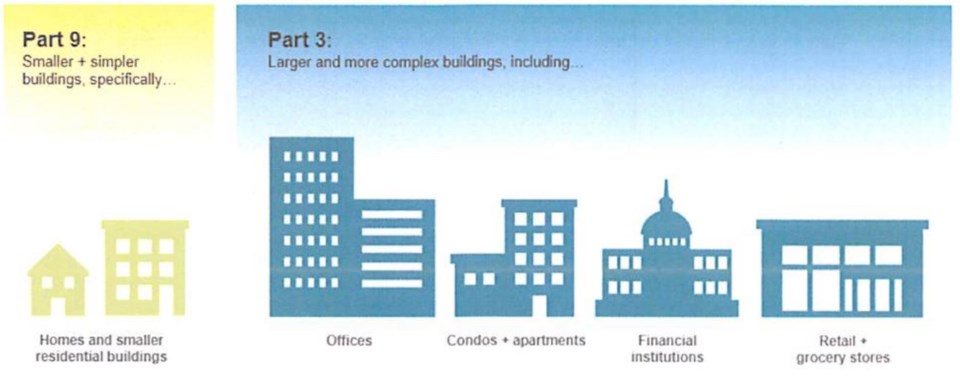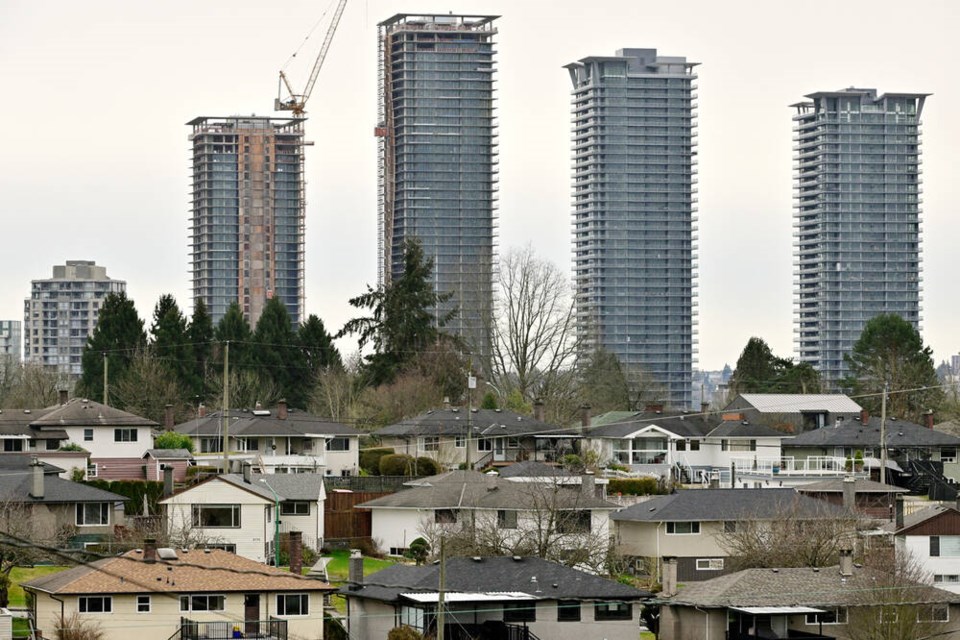It sounds like bureaucratic babble: Part 9 buildings meeting Step 3 energy codes, Part 3 buildings requiring “strong carbon performance.”
But it’s key to fighting the climate crisis, according to the province and environmentalists.
The jargon comes from new provincial changes to the B.C. Building Code, which mean local governments can, for the first time, directly limit the carbon emissions from new buildings.
And with the new changes, Burnaby council wants to require the strongest zero carbon rating for large buildings in seven months time.
The Zero Carbon step code
A staff report presented to council on May 8 laid out a new rating system, called the Zero Carbon step code which targets carbon emissions, which will complement the current energy step code.
The Zero Carbon step code has four levels:
- measure-only (no carbon reductions required),
- moderate performance (emissions limits for space heating or hot water systems),
- strong performance (emissions limits for space heating and hot water systems), and
- zero carbon (no carbon emissions at all).
Burnaby Citizens Association Coun. Alison Gu amended staff recommendations to specifically consider requiring the highest rating, zero carbon performance, by Jan. 1, 2024 for large buildings like condo towers, apartments and offices.
The motion does not approve the step code ratings into city policy at this point but will guide the city’s engagement with industry professionals and the public on how to meet these targets.
Staff also recommended smaller residential buildings like single-family homes and townhouses require moderate carbon performance by Jan. 1, 2024. Gu changed it to consider strong carbon performance by Jan. 1 next year and zero carbon performance by Jan. 1, 2025.
She noted that the cities of Victoria and Saanich have required smaller residential buildings to be zero-carbon step code by Nov. 1, 2023.
Gu said buildings represent about 50 per cent of Burnaby’s citywide greenhouse gas emissions.
“New buildings that are built with fossil gas infrastructure tied in will need to be retrofitted in the future, and that will come at a cost to the residents who live there,” she said at council.
“Cities now have the jurisdiction and the authority to require that new buildings are significantly cleaner, healthier places to live, and more affordable. This is something that is doable. And considering that we are in a climate emergency, it’s also incumbent of us to do this work.”
The staff report said the city had seen a “high level of support” from the public for the city to require low carbon energy systems for smaller residential buildings.
But the city recommended a starting point of moderate carbon performance beginning Jan. 1, 2024, intending to wait for further public engagement.
Gu’s amendments requiring stronger carbon performance sooner unanimously passed, with other councillors vocally supportive.

‘We don’t have much time left’
Metro Vancouver-based climate advocacy group Force of Nature Alliance has been pushing for the step codes to be accelerated by municipalities including Burnaby.
Force of Nature president, Sunil Singal, emphasized buildings are one of the largest contributors to greenhouse gas emissions in Burnaby.
“According to the IPCC reports, we don’t have much time left to bring down our emissions, and … building emissions are one of the highest (GHG emitters). If we can reduce that to zero carbon, that’s fantastic.”
Singal said if Burnaby carries out these policies, it will be a provincial leader in reducing emissions from buildings. He noted if the recommendations go ahead, Burnaby would be ahead of Victoria when it comes to large buildings, which make up the majority of developments.
“There’s not a lot of municipalities that have adopted the Zero Carbon step code … I think the mayor and all of council said that we need to be bold in the climate actions that we take now.”
He added: “We’re cautiously optimistic that if everything goes well with consultations, that they’ll adopt these more bold steps – and we fully welcome them.”
Step codes and the city
The amendments to energy step code (which addresses the energy-efficiency of new buildings) and the creation of the Zero Carbon step code (which targets buildings’ carbon performance) are to ensure the most common types of buildings emit less greenhouse gases, according to the report.
The Zero Carbon step code is currently opt-in by local governments.
“The province has signalled that in the future, carbon performance will be included in the BCBC as requirements (rather than voluntary) in more stringent increments over time … but has not signaled an exact time frame,” said the staff report.
Staff will begin to create engagement plans and implementation strategies for the Zero Carbon step code.
The new Zero Carbon step code has four levels of emissions performance:
- Measure-only: requires measurement of a building’s emissions without reductions and is intended to build knowledge and capacity
- Moderate Carbon Performance: in most cases, will require decarbonization of either space heating or domestic hot water systems
- Strong Carbon Performance: in most cases, will require decarbonization of both space heating and domestic hot water system
- Zero Carbon Performance: will typically require decarbonization of all systems
The province has committed to all new construction being zero-carbon by 2030.





